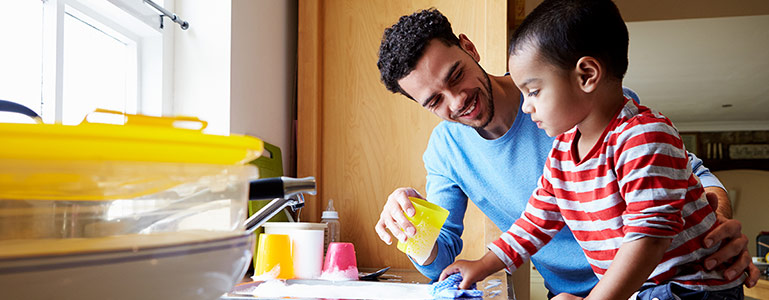We all know the kids who jump up to help their parents clear the table after dinner or walk an older adult across the street, and we want our kids to be those kids. It is not hard to imagine that their instincts to do well for themselves and others will take them far in life. But how does a child without these instincts gain the same skills? How do we impart the value of responsibility and teach our children to be conscientious, competent, and reliable?
Most experts agree that children pick up our values from listening to us and watching us every day. Remember the old adage, “Do as I say, not as I do”? Children learn as much from watching what we do and how we do it as they do from what we say to them. Try these strategies to help kids along their path to responsibility and independence:
- Model responsibility and accountability
Show your children that you take responsibility for getting things done and keeping your word when you have said you will do something. Take out the trash, pick up the cupcakes for the class party, sew the button on your child’s favorite shirt so they can wear it again.
- Give kids the experience of participating in group causes
Make at least one hour a week, or one day a week, a time when all members of the family work together to clean up the house.
- Let your children help you whenever possible
Kids love to help adults with tasks. Even if it may take a little longer to have your little one help you make sandwiches for lunch or bake the cake for the scout meeting, let them help. They learn important skills, and it encourages responsibility and accountability.
- Provide structure in the form of schedules and routine
Get your child into a routine around responsibility as young as possible. It will help tremendously if their responsibilities are built into their day. Have them bring their breakfast dishes to the sink after eating, help wash their dishes if they are old enough, make their bed in the morning, and more.
- Encourage your child to think through situations
Have a chart of responsibilities for them to refer to each day and let them think through the order of events, let them remember how to complete tasks (with simple reminders if needed), and let them organize themselves to get things done in a timely manner (they may need some extra support around this one).
These techniques should go a long way toward fostering the responsibility and cooperation that children need for later success.
Beth Berkowitz, Psy.D. is a Licensed Clinical Psychologist and Director of Children’s Clinical Services and Child Training Institute at Parents Place in San Francisco

